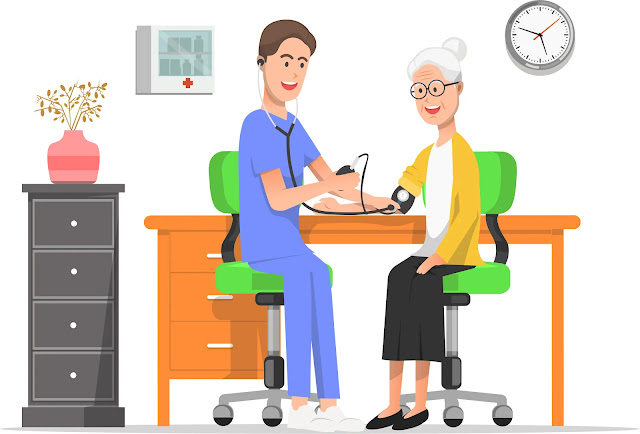Blood Hypertension: Understanding Types, Symptoms, Causes, Complications, and Effective Treatment Options
Hypertension, commonly known as high blood pressure, is a medical condition characterized by elevated blood pressure levels in the arteries. Blood pressure is the force exerted by the blood against the walls of the arteries as it flows through them. When blood pressure is consistently high, it can lead to serious health complications such as heart disease, stroke, and kidney damage. In this article, we will discuss the types of hypertension, signs and symptoms, progression, causes, complications, treatment options, alternative medicine, diet restrictions, nutritional elements, and resources to decrease blood pressure.
Types of Hypertension
There are two types of hypertension: primary and secondary.
Primary hypertension, also called essential hypertension, is the most common type of hypertension and has no identifiable cause. It develops gradually over many years and is usually diagnosed during routine check-ups.
Secondary hypertension, on the other hand, is caused by an underlying medical condition, such as kidney disease, sleep apnea, or adrenal gland tumors.
Signs and Symptoms
In most cases, hypertension does not have any noticeable symptoms. This is why it is often referred to as the "silent killer." However, some people with high blood pressure may experience headaches, shortness of breath, dizziness, blurred vision, chest pain, and nosebleeds.
Progression
Hypertension typically develops over a period of several years and may not cause any noticeable symptoms until it reaches a severe stage. Uncontrolled hypertension can lead to serious health complications such as heart disease, stroke, and kidney damage.
Causes
The exact cause of hypertension is not known. However, several factors can increase the risk of developing hypertension, including:
Age: The risk of developing hypertension increases with age.
Family history: Hypertension tends to run in families.
Obesity: Being overweight or obese increases the risk of hypertension.
Lack of physical activity: A sedentary lifestyle can increase the risk of hypertension.
Smoking: Smoking can damage the arteries and increase the risk of hypertension.
Stress: Chronic stress can increase blood pressure levels.
Complications
If left untreated, hypertension can lead to serious health complications, including:
Heart disease: Hypertension can cause the arteries to become narrow, which can lead to heart disease and heart attacks.
Stroke: Hypertension can cause the blood vessels in the brain to narrow or burst, leading to a stroke.
Kidney damage: Hypertension can damage the blood vessels in the kidneys, leading to kidney disease and kidney failure.
Vision loss: Hypertension can cause damage to the blood vessels in the eyes, leading to vision loss.
Treatment Options
The goal of hypertension treatment is to lower blood pressure levels to a safe range. Treatment may involve lifestyle changes, medication, or a combination of both.
Lifestyle changes that can help lower blood pressure include:
Eating a healthy diet: A diet rich in fruits, vegetables, whole grains, and lean proteins can help lower blood pressure levels.
Regular exercise: Physical activity can help lower blood pressure levels and improve overall health.
Maintaining a healthy weight: Losing even a small amount of weight can help lower blood pressure levels.
Quitting smoking: Smoking can damage the arteries and increase blood pressure levels.
Limiting alcohol consumption: Drinking too much alcohol can raise blood pressure levels.
Medications that can help lower blood pressure include:
Diuretics: These medications help the body get rid of excess water and salt, which can lower blood pressure levels.
ACE inhibitors: These medications can help relax blood vessels, making it easier for blood to flow through them.
Calcium channel blockers: These medications can help relax blood vessels and slow the heart rate, lowering blood pressure levels.
Beta-blockers: These medications can help slow the heart rate and reduce the workload on the heart.
Alternative Medicine
Several alternative therapies may help lower blood pressure levels, including:
Yoga
Diet Restrictions and Nutritional Elements
In addition to lifestyle changes and medication, certain dietary restrictions and nutritional elements may help lower blood pressure levels. These include:
Reducing sodium intake: Limiting sodium intake to less than 2,300 milligrams per day can help lower blood pressure levels.
Increasing potassium intake: Potassium can help lower blood pressure levels. Good sources of potassium include bananas, sweet potatoes, and spinach.
Eating a diet rich in magnesium: Magnesium can help lower blood pressure levels. Good sources of magnesium include whole grains, nuts, and leafy green vegetables.
Resources to Decrease Blood Pressure
There are several resources available to help people manage their blood pressure levels, including:
Blood pressure monitors: These devices can help people monitor their blood pressure levels at home.
Support groups: Joining a support group can provide people with the emotional support they need to manage their hypertension.
Education programs: Educational programs can help people learn more about hypertension and how to manage it effectively.
Conclusion
Hypertension is a serious medical condition that can lead to serious health complications if left untreated. However, through lifestyle changes, medication, and alternative therapies, it is possible to manage hypertension effectively and reduce the risk of complications. By understanding the types of hypertension, signs and symptoms, progression, causes, complications, treatment options, alternative medicine, diet restrictions, and nutritional elements, people can take control of their blood pressure levels and protect their health.




.jpg)



0 Comments